Did you know that purple carrots are not just a visual delight but also offer a plethora of health benefits? These vibrant vegetables are not your ordinary carrots; they are a diverse and nutritious variety that can elevate your diet to a whole new level. From powerful antioxidants to potential anticancer effects, purple carrots have so much to offer. In this article, I will delve into the history and nutrition of purple carrots, explore their health benefits, and provide creative ways to incorporate them into your culinary adventures.
Key Takeaways:
- Purple carrots are not just visually appealing but also packed with essential nutrients.
- They are rich in antioxidants, especially anthocyanins, which contribute to their various health benefits.
- Purple carrots have potential anticancer effects and may help protect against the development of certain types of cancer.
- They can aid in weight loss due to their low calorie and high fiber content.
- Purple carrots may offer specific benefits for certain medical conditions, such as metabolic syndrome and inflammatory bowel conditions.
The History and Nutrition of Purple Carrots
Purple carrots have a fascinating history that can be traced back thousands of years. Originally, carrots were not the familiar orange color we know today. In fact, they were purple or white in color. It was only through a genetic mutation that orange carrots were introduced to the world.
Despite their ancient origins, purple carrots have gained popularity in recent years due to their unique color and impressive nutritional profile. These vibrant vegetables are not only eye-catching on your plate but also packed with essential nutrients.
One key nutrient found in purple carrots is fiber, which plays a crucial role in digestive health. Fiber helps regulate bowel movements, supports a healthy gut microbiome, and can even aid in weight management.
Purple carrots are also rich in potassium, a mineral that is necessary for maintaining proper heart and muscle function. In addition, they are a great source of vitamin C, which boosts immune health and supports collagen production for healthy skin.
What truly sets purple carrots apart is their high content of anthocyanins. These pigments responsible for their deep purple color also act as powerful antioxidants in the body. Studies have shown that anthocyanins can help reduce inflammation, protect against chronic diseases, and even have anti-cancer properties.
The Nutritional Content of Purple Carrots
| Nutrient | Amount per 100g |
|---|---|
| Fiber | 2.9g |
| Potassium | 320mg |
| Vitamin C | 9.4mg |
| Anthocyanins | varies* |
*The exact amount of anthocyanins can vary depending on the specific variety of purple carrots.
With their rich history and impressive nutritional content, purple carrots are a wonderful addition to any diet. Not only do they provide a burst of color to your meals, but they also offer a range of health benefits. So why not give them a try and enjoy their unique flavor and all the goodness they have to offer?
Powerful Antioxidants in Purple Carrots
Purple carrots are not only visually stunning but also packed with powerful antioxidants that contribute to their numerous health benefits. These antioxidants, particularly anthocyanins, play a significant role in promoting overall well-being.
Anthocyanins, the main group of antioxidants found in purple carrots, have been extensively studied for their positive effects on health. These compounds are responsible for the vibrant purple color of the carrots and offer a wide range of potential benefits.
Studies have shown that anthocyanins possess anti-inflammatory properties, which can help reduce inflammation in the body and potentially lower the risk of chronic diseases.
“Anthocyanins have been linked to reduced inflammation, improved heart health, protection against mental decline, and a lower risk of type 2 diabetes”
Additionally, anthocyanins have demonstrated the ability to support heart health by reducing the risk of cardiovascular diseases. They help improve blood vessel function, regulate blood pressure, and lower harmful cholesterol levels.
I’m always amazed by the incredible health benefits that antioxidants like anthocyanins can offer. Incorporating purple carrots into my diet has become a simple yet effective way for me to boost my overall health and well-being.
Moreover, the polyphenols present in purple carrots, such as chlorogenic acid and caffeic acid, also contribute to their health-promoting properties. These polyphenols exhibit antioxidant and anti-inflammatory effects, further enhancing the benefits of purple carrots.
| Purple Carrot Antioxidants | Health Benefits |
|---|---|
| Anthocyanins | Reduced inflammation, improved heart health, protection against mental decline, lower risk of type 2 diabetes |
| Polyphenols | Additional antioxidant and anti-inflammatory effects |
By incorporating purple carrots into your diet, you can harness the power of these antioxidants and enjoy their potential health benefits.
References:
- Johnston, C. S., & Taylor, C. A. (2018). The health benefits of purple carrots and anthocyanins: A review of the evidence. Journal of Functional Foods, 47, 36-43.
- Xia, T., & Yao, J. (2018). The unique health benefits of purple carrots: A review. Journal of Functional Foods, 48, 377-386.
Potential Anticancer Effects of Purple Carrots
Studies have demonstrated the remarkable potential of purple carrots in fighting against cancer. The vibrant hue of purple carrots is indicative of the presence of powerful antioxidants, such as anthocyanins, which have been found to possess remarkable anticancer properties.
In test-tube studies, purple carrot extract has shown promising results in inhibiting the growth and spread of various cancer cells. These findings suggest that purple carrots may play a significant role in preventing and potentially treating certain types of cancer.
Moreover, population studies have provided further evidence of the cancer-fighting capabilities of purple vegetables and fruits, including purple carrots. Regular consumption of purple carrots has been associated with a lower risk of colorectal and breast cancer, two of the most prevalent forms of cancer.
By incorporating purple carrots into your diet, you can harness the potential health benefits of these antioxidant-rich vegetables. So, why not indulge in the vibrant flavors of purple carrots while potentially safeguarding your health against cancer?
“The powerful antioxidants found in purple carrots have demonstrated their ability to combat cancer cells, offering hope for a brighter, healthier future.”
Comparative Analysis: Purple Carrots versus Other Colored Varieties
| Antioxidants | Purple Carrots | Orange Carrots |
|---|---|---|
| Anthocyanins | High | Low |
| Beta-Carotene | Low | High |
| Vitamin A Content | Moderate | High |
Purple Carrots for Weight Loss
Purple carrots can be a beneficial addition to a weight loss diet. Not only are they deliciously vibrant, but they also offer a range of health benefits that can support your weight loss journey. Here are some reasons why purple carrots can help you shed those extra pounds.
Low in Calories, High in Fiber
When it comes to weight loss, a low-calorie diet is essential. Purple carrots are naturally low in calories, making them a great choice for those looking to cut down on their calorie intake. Additionally, purple carrots are high in dietary fiber, which helps you feel fuller for longer and prevents overeating. Fiber also aids digestion and keeps your gut healthy. So, by incorporating purple carrots into your meals, you can enjoy a satisfying and filling dish without consuming too many calories.
Antioxidant Power
One of the key factors in weight loss is reducing oxidative stress and inflammation in the body. Purple carrots are packed with antioxidants that can help you achieve this. The antioxidants in purple carrots neutralize harmful free radicals, reduce inflammation, and protect against oxidative stress. By including purple carrots in your diet, you can support your body’s natural detoxification processes and promote overall well-being.
Ways to Enjoy Purple Carrots
If you’re wondering how to incorporate purple carrots into your weight loss meals, here are a few ideas:
- Add sliced purple carrots to your favorite salad for a pop of color and crunch.
- Roast purple carrots with a sprinkle of herbs and olive oil for a tasty side dish.
- Include purple carrots in your stir-fries or vegetable medleys for added texture and flavor.
- Blend purple carrots into smoothies for a nutrient-packed boost.
With these creative and delicious ways to enjoy purple carrots, you can make your weight loss journey a flavorful and enjoyable experience.
Purple Carrots for Certain Medical Conditions
Purple carrots offer a range of health benefits that can be particularly advantageous for individuals with specific medical conditions. Studies have shown that the anthocyanins found in purple carrots can have a positive impact on conditions such as metabolic syndrome and inflammatory intestinal conditions. Let’s explore how purple carrots can contribute to better health for individuals facing these challenges.
Improving Symptoms of Metabolic Syndrome
Metabolic syndrome is a cluster of conditions that often occur together and increase the risk of heart disease, stroke, and type 2 diabetes. This condition is characterized by high blood sugar, high blood pressure, excess body fat, and abnormal cholesterol levels. Purple carrots, with their potent anthocyanins, can help improve symptoms associated with metabolic syndrome.
Anthocyanins have been shown to lower blood sugar levels and regulate insulin sensitivity, leading to better glucose control. Additionally, the antioxidant properties of purple carrots can help reduce inflammation, improve blood vessel function, and lower blood pressure. These combined effects make purple carrots a valuable addition to the diet for individuals managing metabolic syndrome.
Reducing Inflammation in Inflammatory Intestinal Conditions
Inflammatory intestinal conditions, like colitis, involve chronic inflammation of the digestive tract, leading to symptoms such as abdominal pain, diarrhea, and weight loss. Purple carrots have been found to have anti-inflammatory properties that can help alleviate symptoms associated with these conditions.
The anthocyanins and other antioxidants present in purple carrots help combat oxidative stress and reduce inflammation in the intestinal lining. This can provide relief from symptoms and support the healing process. Including purple carrots in the diet, along with other anti-inflammatory foods, can be beneficial for individuals with inflammatory intestinal conditions.
“Purple carrots, with their potent anthocyanins, can help improve symptoms associated with metabolic syndrome.”
| Medical Condition | Purple Carrot Benefits |
|---|---|
| Metabolic Syndrome | – Helps regulate blood sugar levels – Improves insulin sensitivity – Reduces inflammation – Lowers blood pressure |
| Inflammatory Intestinal Conditions | – Reduces inflammation in the digestive tract – Alleviates symptoms like abdominal pain and diarrhea |
Creative Ways to Enjoy Purple Carrots
Purple carrots are not only nutritious but also incredibly versatile in the kitchen. From salads to soups, there are numerous creative ways to incorporate these vibrant vegetables into your meals. Whether you prefer raw, cooked, or blended dishes, purple carrots can add a touch of color and flavor to your culinary adventures.
1. Purple Carrot Salad
One of the simplest and most refreshing ways to enjoy purple carrots is in a salad. Thinly slice or grate the carrots and mix them with your favorite greens, such as spinach or arugula. Add some roasted nuts, crumbled feta cheese, and a tangy vinaigrette dressing for a delicious and visually appealing purple carrot salad.
2. Purple Carrot Soup
Create a comforting and vibrant purple carrot soup by simmering diced purple carrots with onions, garlic, vegetable broth, and your choice of spices. Once the carrots are tender, blend the mixture until smooth, and garnish with a drizzle of coconut milk or a sprinkle of fresh herbs. Serve this colorful soup as an appetizer or a light meal.
3. Roasted Purple Carrots
Roasting brings out the natural sweetness of purple carrots and adds a delightful caramelized flavor to them. Toss the carrots in olive oil, sprinkle with salt and pepper, and roast in the oven until they are tender and slightly crispy. You can experiment with different herbs and spices like thyme, rosemary, or cumin to enhance the taste.
4. Purple Carrot Hummus
Elevate your homemade hummus by adding cooked and mashed purple carrots to the traditional recipe. The purple hue will create an appealing visual contrast with the chickpeas. Spread the purple carrot hummus on whole-grain crackers or use it as a dip for fresh vegetables, such as cucumber sticks or sliced bell peppers.
5. Baked Goods with Purple Carrots
Grate purple carrots and incorporate them into muffins, cakes, or bread for a vibrant twist. The carrots add moisture and natural sweetness to the baked goods while infusing them with a stunning purple hue. Experiment with different spices like cinnamon or nutmeg to complement the earthy flavor of the purple carrots.
These are just a few examples of the many ways you can enjoy purple carrots in your meals. You can also juice them, dehydrate them as a healthy snack, or simply savor them raw with a dip. Let your imagination run wild and explore the culinary possibilities that these colorful and nutritious vegetables can offer.
Nutritional Comparison of Purple and Orange Carrots
When it comes to nutritional value, purple and orange carrots offer distinct benefits due to their unique antioxidant profiles. Purple carrots are known for their higher levels of anthocyanins, while orange carrots are rich in beta-carotene. Let’s take a closer look at the nutritional comparison between these vibrant varieties.
Purple Carrots: Rich in Anthocyanins
Purple carrots are a nutritional powerhouse, thanks to their deep hue. Anthocyanins, the pigments responsible for their purple color, are powerful antioxidants that have been linked to numerous health benefits, including:
- Reduced inflammation
- Improved heart health
- Protection against cognitive decline
These antioxidants in purple carrots may contribute to a lower risk of type 2 diabetes as well.
Orange Carrots: Abundant in Beta-Carotene
Orange carrots, on the other hand, are well-known for their high beta-carotene content. Beta-carotene is a precursor of vitamin A, which plays a vital role in promoting healthy vision, a robust immune system, and optimal skin health. It also acts as an antioxidant in the body, protecting cells from damage caused by harmful free radicals.
Let’s take a closer look at the nutritional comparison of these two colorful vegetables:
| Nutrient | Purple Carrot | Orange Carrot |
|---|---|---|
| Antioxidants | High levels of anthocyanins | Rich in beta-carotene |
| Vitamin A | Lower vitamin A content compared to orange carrots | Abundant in beta-carotene, a precursor of vitamin A |
| Vitamin C | Similar levels to orange carrots | Similar levels to purple carrots |
| Fiber | Similar levels to orange carrots | Similar levels to purple carrots |
By incorporating both purple and orange carrots into your diet, you can benefit from a diverse range of antioxidants, vitamins, and minerals. Embrace the vibrant colors and nutritional power of these carrot varieties to enhance the overall nutritional value of your meals.
Cooking and Storing Purple Carrots
Purple carrots are not only a vibrant addition to your plate but also offer a wide range of culinary possibilities. Whether you prefer to roast, boil, or incorporate them into soups and stews, purple carrots can add a unique burst of color and flavor to your dishes. Here are some cooking methods and storage tips to help you make the most of these versatile vegetables:
Cooking Methods for Purple Carrots
Purple carrots can be cooked using various methods to suit your taste preferences and desired level of tenderness. Here are a few popular techniques:
- Roasting: Preheat your oven to 400°F (200°C). Toss peeled and chopped purple carrots with olive oil, salt, and pepper. Spread them out in a single layer on a baking sheet and roast for about 25-30 minutes until tender and caramelized.
- Boiling: Place peeled and sliced purple carrots in a pot of boiling water and cook for 8-10 minutes or until tender. Drain and season with your favorite herbs and spices.
- Stews and Soups: Purple carrots can add depth of flavor to hearty stews and soups. Add them to the pot during the cooking process, ensuring they have enough time to become tender and infuse the dish with their unique color and taste.
Storing Purple Carrots
Proper storage is essential to maintain the freshness and flavor of your purple carrots. Follow these guidelines:
- Cool, Dry Place: Store unwashed purple carrots in a cool, dry place away from direct sunlight. They can be kept at room temperature for several days.
- Refrigerator: To extend the shelf life, you can place purple carrots in a plastic bag or airtight container and keep them in the refrigerator’s crisper drawer. They can last for up to two weeks when stored this way.
- Blanching and Freezing: If you have a surplus of purple carrots, blanching and freezing them can help preserve their quality. Start by cutting the carrots into desired sizes, blanch them in boiling water for a few minutes, then submerge them in an ice bath to stop the cooking process. Drain and transfer to freezer-safe bags or containers. They can be kept in the freezer for up to 12 months.
Now that you know how to cook and store purple carrots, it’s time to get creative in the kitchen. Experiment with different recipes to fully embrace the vibrant goodness of these nutritious vegetables.
The Nutritional Power of Purple Carrots
Purple carrots are a nutritional powerhouse, packed with essential vitamins, minerals, and dietary fiber. Including purple carrots in your diet is not only delicious but also an excellent way to boost your overall health and well-being.
Purple Carrot Nutrition Facts
Let’s take a look at the impressive nutritional profile of purple carrots:
| Nutrient | Amount per 100g |
|---|---|
| Vitamin A | 4,882 IU |
| Vitamin C | 6.1 mg |
| Potassium | 320 mg |
| Dietary Fiber | 3.6 g |
Purple carrots are an excellent source of vitamin A, which is essential for maintaining healthy vision, promoting cellular growth, and supporting immune function. Vitamin C, another powerful antioxidant found in purple carrots, plays a vital role in collagen synthesis, boosting immune function, and protecting against oxidative damage.
Furthermore, purple carrots are rich in potassium, an essential mineral that helps regulate blood pressure, support heart health, and maintain proper muscle and nerve function. The dietary fiber content in purple carrots contributes to digestive health, aids in weight management, and promotes a feeling of fullness.
Purple Carrot Vitamins and Minerals
In addition to vitamin A, vitamin C, and potassium, purple carrots also contain several other important vitamins and minerals that contribute to overall health:
- Vitamin K: Supports blood clotting and bone health.
- Folate: Essential for DNA synthesis and cell growth.
- Manganese: Plays a role in metabolism and antioxidant defense.
- Calcium: Important for bone strength and muscle function.
- Phosphorus: Helps form strong bones and teeth.
With their impressive array of vitamins and minerals, purple carrots offer a well-rounded nutritional profile that can support various aspects of your health.
“Including purple carrots in your diet is not only delicious but also an excellent way to boost your overall health and well-being.”
Incorporating purple carrots into your diet is easy and enjoyable. You can enjoy them raw in salads, roasted as a side dish, or blended into a flavorful soup. Get creative in the kitchen and explore new ways to incorporate these vibrant vegetables into your meals.
Now that you know the nutritional power of purple carrots, you can confidently add them to your shopping list and reap the numerous health benefits they offer.
Conclusion
Purple carrots are a vibrant and nutritious addition to any diet. Their striking color is a testament to their powerful antioxidant properties, particularly the presence of anthocyanins. These antioxidants offer a range of health benefits, including support for heart health, reduced inflammation, and potential protection against certain types of cancer.
By incorporating purple carrots into your meals, you can enjoy not only their nutritional power but also their culinary versatility. Whether you choose to add them to salads, roast them with herbs and spices, or use them in soups and stews, purple carrots can elevate your dishes and add a touch of color to your plate.
In summary, purple carrots are more than just visually appealing. They are a nutritional powerhouse that can contribute to your overall well-being. So, why not get creative in the kitchen and unlock the full potential of purple carrots in your diet?

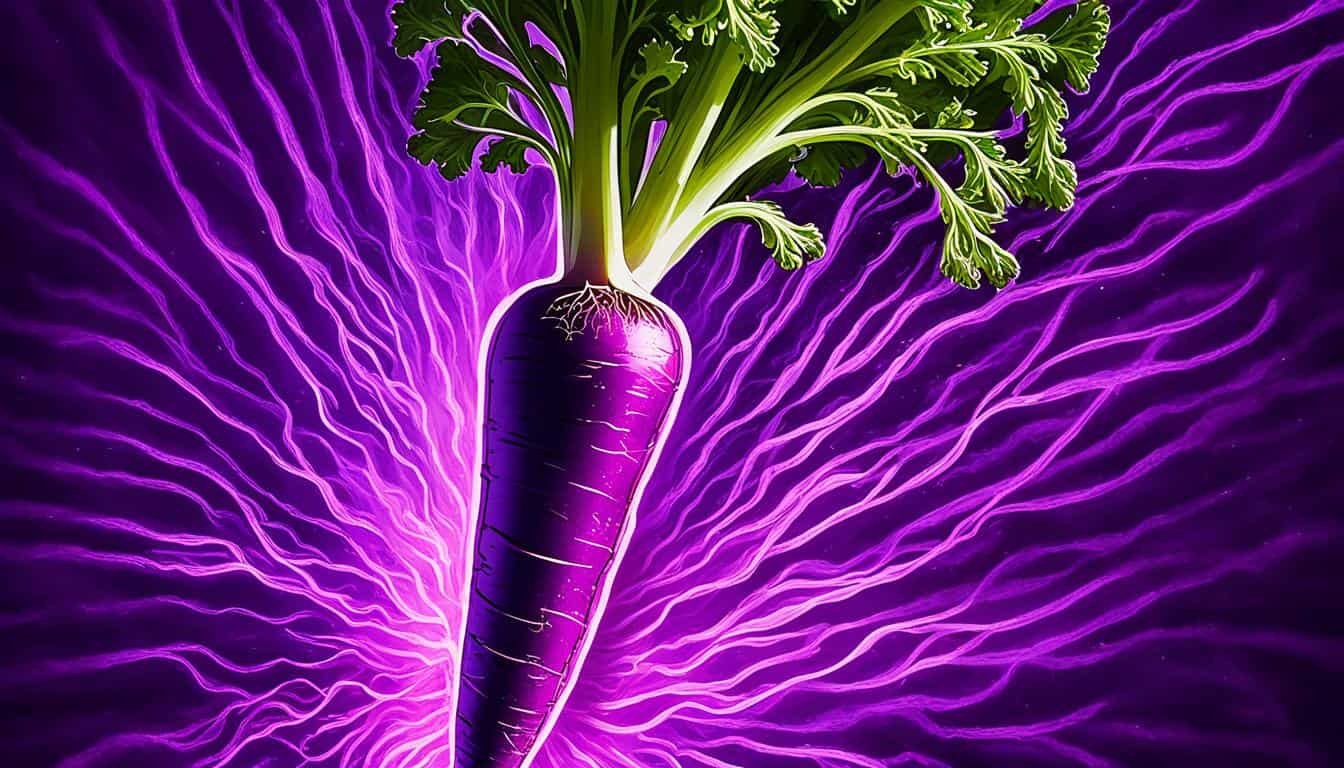
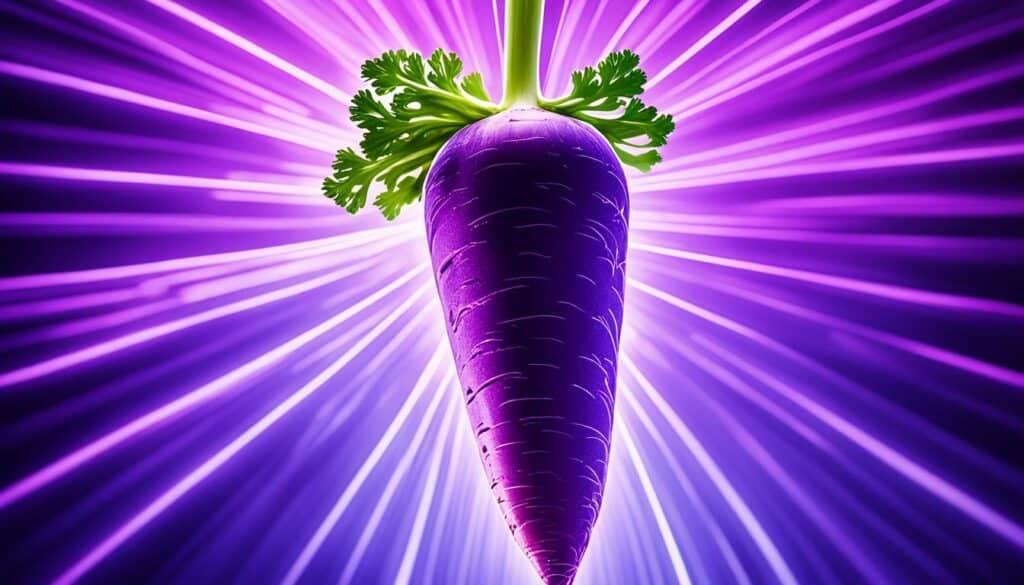
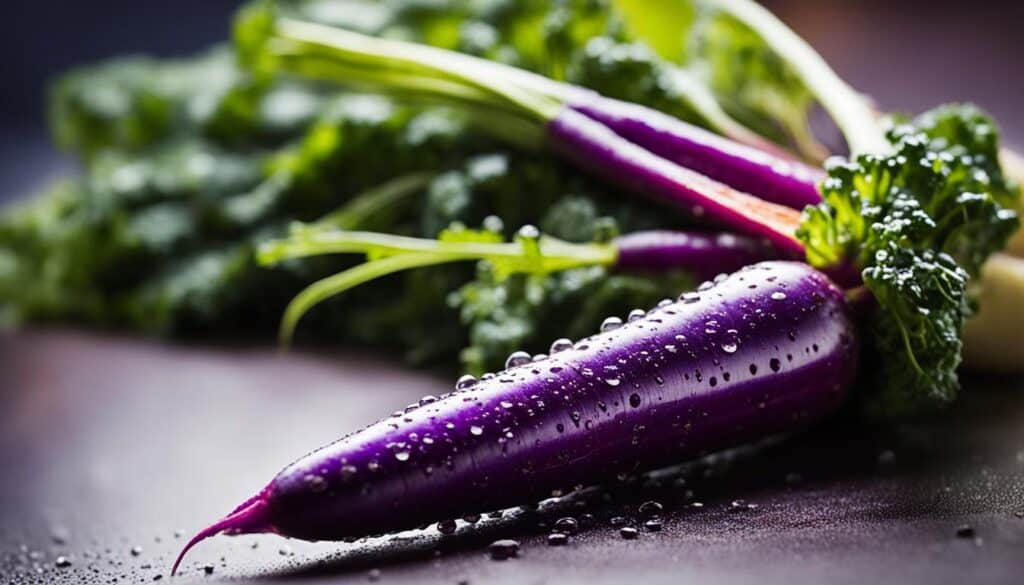

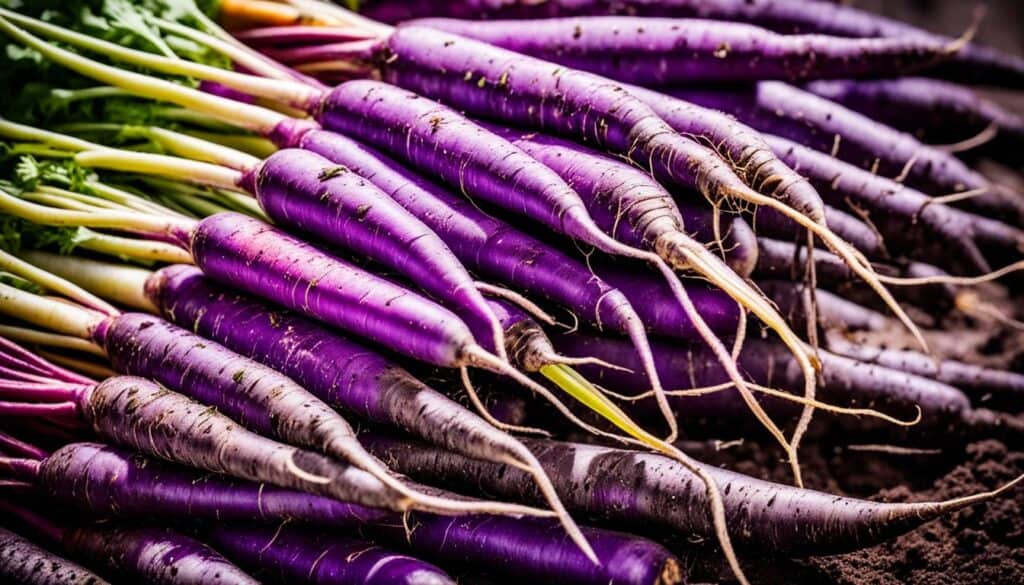
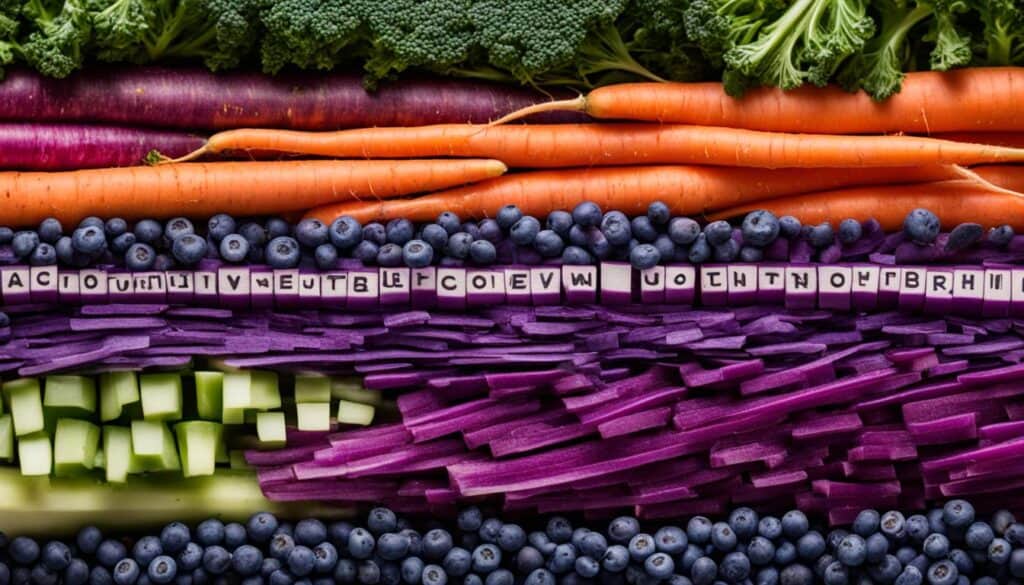



Leave a Reply